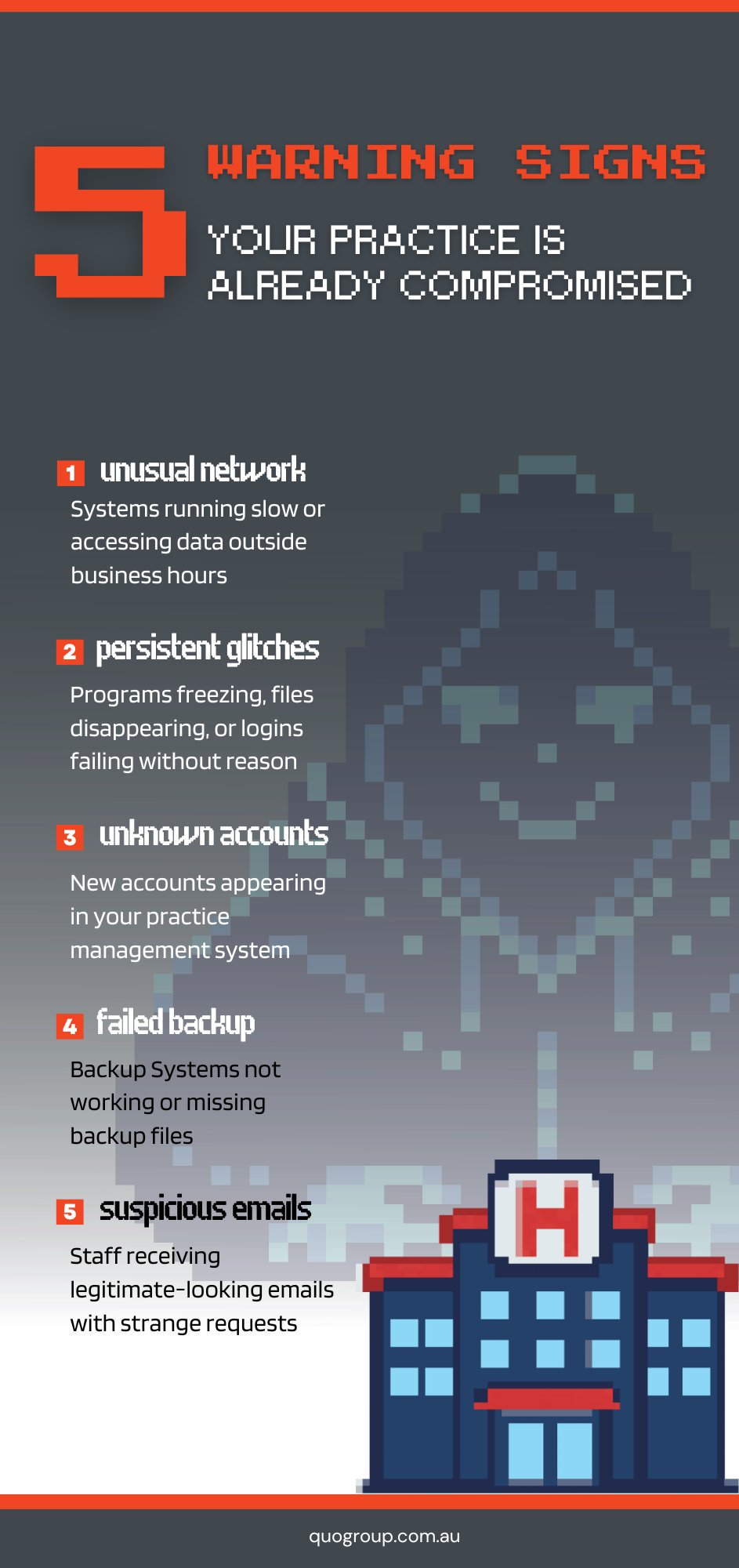Cybersecurity threats targeting Australian healthcare practices are becoming increasingly common. While you’re focused on providing excellent patient care, it’s important to understand these risks and how to protect your practice effectively.
Recent incidents have shown that healthcare practices of all sizes can be affected by ransomware attacks, making it essential for practice managers to be informed and prepared.
Why Healthcare Practices Are Targeted
Why healthcare practices are perfect targets:
- Valuable Information. Patient records have significant value on the dark web. Names, Medicare numbers, medical histories, this information is highly valuable to criminals.
- Operational Pressure. When your systems crash, patients can’t be seen. Every hour costs you money and stresses your team.
- Resource Constraints. Most practices don’t have dedicated IT security teams. You’re focused on patient care, not cyber threats.
This combination of factors makes healthcare practices attractive targets for cybercriminals looking for opportunities.
Understanding Modern Attack Methods
- The Phishing Email: Modern attacks look completely legitimate, often appearing to come from trusted software vendors or government agencies requesting “urgent updates.” These emails use proper logos, professional formatting, and convincing language.
- AI-Enhanced Attacks: These sophisticated, AI-powered attacks are becoming increasingly difficult to detect, even for experienced users.
- Silent Infiltration: Once inside, attackers quietly map your systems, locate backups (and disable them), and study your practice routines for weeks without detection.
- Strategic Timing: Attacks typically occur outside business hours when IT support is limited, maximising the time before detection and response.
Real Australian Impact
Recent high-profile breaches have affected major Australian organisations, including Medibank, where nearly 10 million Australians had their health information compromised, and the Genea fertility clinic breach, where sensitive reproductive health data was exposed and later published on the dark web.
These were sophisticated, targeted attacks on healthcare providers, demonstrating that cybersecurity threats are a genuine concern across the healthcare sector.
Warning Signs You’re Already Compromised

Many practices are already compromised and don’t know it. If you notice any of these signs, it’s important to contact your IT support team promptly for assessment.
Building an Effective Defence Strategy
While no system is attack-proof, these strategies help significantly reduce your risk:
- Staff Training: Your team needs to recognise sophisticated phishing attempts and understand proper security procedures. It’s not about making them IT experts, it’s about awareness.
- Robust Backups: automated backups stored separately from your main network, tested regularly, and protected from attacks. If your backups aren’t tested, they’re just expensive storage.
- Professional Monitoring: 24/7 surveillance for unusual activity, controlled access to sensitive data, and proper incident response plans. Because attacks don’t happen when it’s convenient.
This is where comprehensive IT infrastructure management becomes crucial, it’s about keeping systems secure, not just running.
Understanding the True Impact
A successful cyber attack involves costs that extend well beyond any ransom demand:
Immediate Consequences:
- Lost revenue from cancelled appointments
- Staff unable to access essential systems
- Emergency IT response costs
- Potential ransom payments with no guarantee of data recovery
Longer-term Effects:
- Regulatory investigations and compliance requirements
- Damage to patient trust and practice reputation
- Legal costs and increased insurance premiums
- Months of system rebuilding and recovery work
Healthcare practices can face tens of thousands of dollars in lost revenue, and that’s before accounting for the extended recovery period.
Taking Action Now
Immediate Actions:
- Review your current security setup. When was it last professionally assessed?
- Test your backup systems by actually restoring some files
- Discuss email security awareness with your team
- Ensure you have a clear incident response plan that everyone understands
Professional Support:
Consider partnering with IT specialists who understand healthcare environments and offer Australian data sovereignty, regular monitoring, and healthcare-specific security expertise.
At Quo Group, we work with healthcare practices across Australia to help reduce cybersecurity risks while keeping systems running smoothly. Our Medical IT Solutions are designed specifically for Australian healthcare providers, with comprehensive security consulting that helps identify vulnerabilities before they become problems.
Moving Forward with Confidence
Cybersecurity threats are an ongoing reality in today’s digital environment, but they can be managed effectively with proper preparation and professional support.
The key is being proactive rather than reactive, ensuring you have robust systems and reliable support in place before any issues arise.
With appropriate preparation, monitoring, and professional guidance, you can significantly reduce your risk and maintain focus on what matters most: providing excellent patient care.
Ready to strengthen your defences?
Call our friendly team on 1800 234 357 or contact us online to discuss how we can help protect your practice and keep your focus where it belongs, on patient care.





